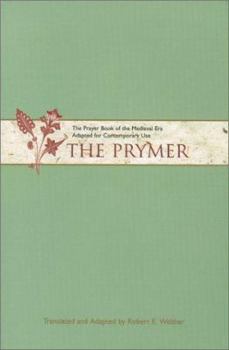The Prymer: The Prayer Book of the Medieval Era Adapted for Contemporary Use
Worship, spirituality, and community have become the three most important concerns for postmodern Christianity. Because our postmodern mood of faith is characterized by a new nostalgia for the past,... This description may be from another edition of this product.
Format:Paperback
Language:English
ISBN:1557252564
ISBN13:9781557252562
Release Date:January 2000
Publisher:Paraclete Press (MA)
Length:172 Pages
Weight:0.74 lbs.
Dimensions:0.5" x 6.0" x 8.9"
Related Subjects
Devotionals Prayerbooks Religion Religion & Spirituality Spirituality Worship & DevotionCustomer Reviews
5 ratings
The Prymer
Published by Thriftbooks.com User , 18 years ago
There is something magical about reciting the same prayers as ones ancestors.
Prymed and ready...
Published by Thriftbooks.com User , 20 years ago
This is a book that was over a thousand years in the making. `The Prymer' finds its origins in the monastic cycles of prayers as long ago as the ninth century. This was at first a way of keeping the monks together in common prayer, then expanded to the general clergy (most of whom were trained in monastic settings), and then generally filtered out to the general laity, who used the prayers contained herein for private devotions and as a literacy tool, to help children and other adults learn how to read with something familiar.`The Prymer' was one of the more popular books for centuries. Long before general availability and ownership of the Bible became common, `The Prymer' was one of the few common devotional guides available. In addition to being inspired by pieces from scripture, there are in total 63 psalms included in the Prymer cycle, which became the core of medieval practical devotions.There are two primary sections of book - Prayers and Readings for Daily Devotion (derived from the Hours of monastic cycles), and Prayers and Readings for a Time of Grief (coming from the Office of the Dead). Death was commonplace at different times as wars and plagues swept through, so this was an important addition to daily cycles.The editor Robert Webber writes in his introduction that this book was part of the transition from Lectio Divina of monastic practice to ruminato forms of prayer (much in the way many of us conceive of and practice prayer today). Ruminato means to consider or to meditate, which is one of the primary hallmarks of prayer today. It becomes personalised and interior, even when directed by outside voices or readings. Ruminato seemed to have more care for the spiritual formation of a person than Lectio Divina (one might argue against this, actually). However, in keeping with this idea, Webber provided ample margins in the text for the user to jot notes and inspirational pieces. There are 8 primary offices to the first section: Matins, Lauds, Prime, Terce, Sext, None, Vespers, and Compline. Webber has given suggestions for using this book, including a one-day retreat (engaging each office in order at the appropriate daily time); a weekly cycle of going through offices, a 30-day cycle, and combination cycles that derive from the different liturgical seasons. Webber writes about the way in which one proceeds - going through slowly and meditatively, not rushing through, trying to get to the end. There are certain offices with more energy or more contemplative feeling to them; Webber introduces each office with a brief description and suggestions for what one will experience. This is a fascinating book, useful for people looking for private worship practices, small group activities, or even for parish-based use. The prayers have a very traditional feel to them in many respects, but Webbers updated language gives them new vitality.
Interesting, engaging, useful
Published by Thriftbooks.com User , 22 years ago
Though it certainly has its weaknesses and eccentricities (it's developed from late medieval sources), The Prymer, a translation of the Little Office of the Blessed Virgin Mary and some other sources, is a wonderful invitation to daily prayer. This version of the office is focused on the psalms and the story the crucifixion. The office is easily adaptable to various needs, and the author includes a number of other psalm-focused devotions (for Advent, Lent, and Easter), a Lenten litany, and a special version of the office for use in times of grief. Marian devotions are included, but protestant users shouldn't find them excessive. A good, portable, personal prayer book.
Disciplined Prayer is not a bad thing
Published by Thriftbooks.com User , 23 years ago
Centered in the ancient tradition of daily fixed-hour prayer, The Prymer: The Prayer Book Of The Medieval Era Adapted For Contemporary Use focuses throughout the day on the hours of Christ's passion and death and has been recommended to Roman Catholics, Orthodox Christian, and Protestant readerships. I am a Presbyterian, raised in both the Catholic Church and the Episcopal Church and find this book outstanding. I pray twice a day, once in the evening focusing on private issues and having a beautiful conversation with My Lord and in the morning for some disciplined prayer. I follow the seasons and pray fervently as those in the past. This book is an outstanding tool for me. I hope to have it memorized this year.
Centered in the ancient tradition of daily fixed-hour prayer
Published by Thriftbooks.com User , 23 years ago
Centered in the ancient tradition of daily fixed-hour prayer, The Prymer: The Prayer Book Of The Medieval Era Adapted For Contemporary Use focuses throughout the day on the hours of Christ's passion and death. Designed for personal or communal use in a one-day retreat, a weekly cycle, or a thirty-day cycle of prayer, The Prymer also includes special prayers for the Christmas and Eater Seasons. The Prymer is exceptional and highly recommended to Roman Catholics, Orthodox Christian, and Protestant readerships.





